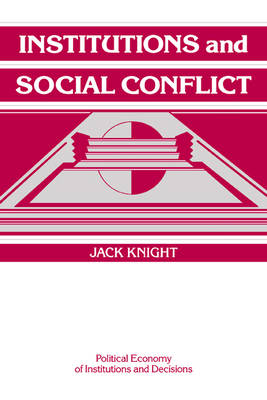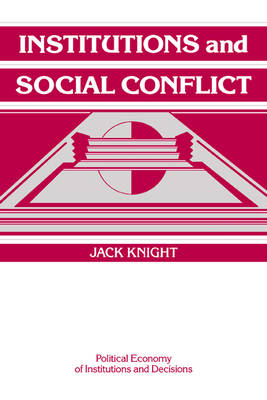
- Afhalen na 1 uur in een winkel met voorraad
- Gratis thuislevering in België vanaf € 30
- Ruim aanbod met 7 miljoen producten
- Afhalen na 1 uur in een winkel met voorraad
- Gratis thuislevering in België vanaf € 30
- Ruim aanbod met 7 miljoen producten
Zoeken
Omschrijving
Many of the fundamental questions in social science entail an examination of the role played by social institutions. Why do we have so many social institutions? Why do they take one form in one society and quite different ones in others? In what ways do these institutions originally develop? And when and why do they change? Institutions and Social Conflict addresses these questions in two ways. First it offers a thorough critique of a wide range of theories of institutional change, from the classical accounts of Smith, Hume, Marx and Weber to the contemporary approaches of evolutionary theory, the theory of social conventions and the new institutionalism. Second, it develops a new theory of institutional change that emphasizes the distributional consequences of social institutions. The emergence of institutions is explained as a by-product of distributional conflict in which asymmetries of power in a society generate institutional solutions to conflicts. The book draws its examples from an extensive variety of social institutions.
Specificaties
Betrokkenen
- Auteur(s):
- Uitgeverij:
Inhoud
- Aantal bladzijden:
- 252
- Taal:
- Engels
- Reeks:
Eigenschappen
- Productcode (EAN):
- 9780521421898
- Verschijningsdatum:
- 30/10/1992
- Uitvoering:
- Paperback
- Formaat:
- Trade paperback (VS)
- Afmetingen:
- 153 mm x 229 mm
- Gewicht:
- 353 g

Alleen bij Standaard Boekhandel
+ 92 punten op je klantenkaart van Standaard Boekhandel
Beoordelingen
We publiceren alleen reviews die voldoen aan de voorwaarden voor reviews. Bekijk onze voorwaarden voor reviews.








